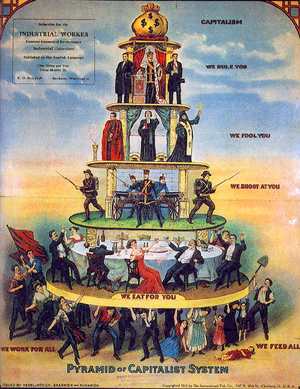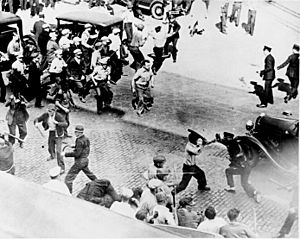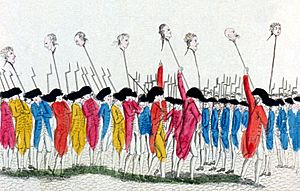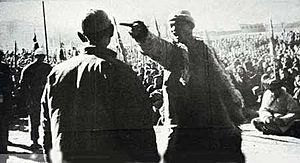Class conflict facts for kids
In political science, the term class conflict (also class struggle, class warfare, capital-labour conflict) identifies the political tension and economic antagonism that exist among the social classes of society, because of socioeconomic competition for resources among the social classes, between the rich and the poor. In the political and economic philosophies of Karl Marx and Mikhail Bakunin, class struggle is a central tenet and a practical means for effecting radical sociopolitical changes for the social majority, the working class.
The forms of class conflict include direct violence, wars, for access to and control of natural resources and labour; assassinations and revolution; indirect violence, such as death from poverty and starvation, illness and unsafe working conditions; economic coercion, such as the threat of unemployment and capital flight, the withdrawal of investment capital; and ideologically, by way of political literature.
The political forms of class warfare include lobbying (legal and illegal) and bribery of legislators. The social-class conflict can be direct, as in a dispute between labour and management such as an employer's industrial lockout of their employees in effort to weaken the bargaining power of the corresponding trade union; or indirect such as a workers' slowdown of production in protest against unfair labor practices, low wages, and poor working conditions.
Contents
Usage
In political science, socialists and Marxists use the term class conflict to define a social class by its relationship to the means of production, such as factories, agricultural land, and industrial machinery. The social control of labor and of the production of goods and services, is a political contest between the social classes.
The anarchist Mikhail Bakunin said that the class struggles of the working class, the peasantry, and the working poor were central to realizing a social revolution to depose and replace the ruling class, and the creation of libertarian socialism.
Marx's theory of history proposes that class conflict is decisive in the history of economic systems organized by hierarchies of social class such as capitalism and feudalism. Marxists refer to its overt manifestations as class war, a struggle whose resolution in favor of the working class is viewed by them as inevitable under the plutocratic capitalism.
Oligarchs versus commoners
Where societies are socially divided based on status, wealth, or control of social production and distribution, class structures arise and are thus coeval with civilization itself. This has been well documented since at least European classical antiquity such as the Conflict of the Orders and Spartacus, among others.
Patricians versus plebeians
It was similarly difficult for the Romans to maintain peace between the upper class, the patricians, and the lower class, the plebs. French Enlightenment philosopher Montesquieu notes that this conflict intensified after the overthrow of the Roman monarchy. In The Spirit of Laws he lists the four main grievances of the plebs, which were rectified in the years following the deposition of King Tarquin:
- The patricians had much too easy access to positions of public service.
- The constitution granted the consuls far too much power.
- The plebs were constantly verbally slighted.
- The plebs had too little power in their assemblies.
Masters versus workmen
Writing in pre-capitalist Europe, both the Swiss philosophe Jean-Jacques Rousseau and the Scottish Enlightenment philosopher Adam Smith made significant remarks on the dynamics of class struggle, as did the Federalist statesman James Madison across the Atlantic Ocean. Later, in the age of early industrial capitalism, English political economist John Stuart Mill and German idealist Georg Wilhelm Friedrich Hegel would also contribute their perspectives to the discussion around class conflict between employers and employees.
Capitalist societies
The typical example of class conflict described is class conflict within capitalism. This class conflict is seen to occur primarily between the bourgeoisie and the proletariat, and takes the form of conflict over hours of work, value of wages, division of profits, cost of consumer goods, the culture at work, control over parliament or bureaucracy, and economic inequality. The particular implementation of government programs which may seem purely humanitarian, such as disaster relief, can actually be a form of class conflict.
Socialism
Libertarianism
Charles Comte and Charles Dunoyer argued that class struggle came from factions that managed to gain control of the State power. The ruling class are the groups that seize the power of the State to carry out their political agenda, the ruled are then taxed and regulated by the State for the benefit of the Ruling classes. Through taxation, state power, subsidies, Tax codes, laws, and privileges the State creates class conflict by giving preferential treatment to some at the expense of others by force. In the free market, by contrast, exchanges are not carried out by force but by the Non-aggression principle of cooperation in a Win-win scenario.
Relationship to race
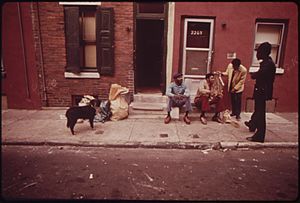
Some historical tendencies of Orthodox Marxism reject racism, sexism, etc. as struggles that essentially distract from class struggle, the real conflict. These divisions within the class prevent the purported antagonists from acting in their common class interest. However, many Marxist internationalists and anti-colonial revolutionaries believe that sex, race and class are bound up together. Within Marxist scholarship there is an ongoing debate about these topics.
According to Michel Foucault, in the 19th century, the essentialist notion of the "race" was incorporated by racists, biologists, and eugenicists, who gave it the modern sense of "biological race" which was then integrated into "state racism". On the other hand, Foucault claims that when Marxists developed their concept of "class struggle", they were partly inspired by the older, non-biological notions of the "race" and the "race struggle". Quoting a non-existent 1882 letter from Marx to Friedrich Engels during a lecture, Foucault erroneously claimed Marx wrote: "You know very well where we found our idea of class struggle; we found it in the work of the French historians who talked about the race struggle." For Foucault, the theme of social war provides the overriding principle that connects class and race struggle.
Moses Hess, an important theoretician and labor Zionist of the early socialist movement, in his "Epilogue" to "Rome and Jerusalem" argued that "the race struggle is primary, the class struggle secondary. [...] With the cessation of race antagonism, the class struggle will also come to a standstill. The equalization of all classes of society will necessarily follow the emancipation of all the races, for it will ultimately become a scientific question of social economics."
W. E. B. Du Bois theorized that the intersectional paradigms of race, class, and nation might explain certain aspects of black political economy. Patricia Hill Collins writes: "Du Bois saw race, class, and nation not primarily as personal identity categories but as social hierarchies that shaped African-American access to status, poverty, and power."
In modern times, emerging schools of thought in the U.S. and other countries hold the opposite to be true. They argue that the race struggle is less important, because the primary struggle is that of class since labor of all races face the same problems and injustices.
Chronology
Riots with a nationalist background are not included.
Classical antiquity
- Gracchi Tribuneship
- Social War, 91–88 BC
- Gallic Wars and the assassination of Julius Caesar, according to Michael Parenti
- Conflict of the Orders
- Roman Servile Wars
- Yellow Turban Rebellion, 184–205 AD
Middle Ages
- Ciompi in Florence, 1378
- Peasants' Revolt in England, 1381
- Jacquerie in 14th-century France
- Saint George's Night Uprising
Modern era
- German Peasants' War since 1524
- Shimabara Rebellion, 1637–1638
- English Civil War, 1642–1651 (Diggers)
- French Revolution since 1789
- Old Price Riots, 1809
- July Revolution, 1830
- Canut revolts in Lyon since 1831, often considered as the beginning of the modern labor movement
- June Rebellion, 1832
- Galician slaughter, 1846
- Revolutions of 1848 in France et al.
- Newport Rising, political revolt in 1839 led by Chartists
- Paris Commune, 1871
- Johnson County War, 1889–1893
- Coal Wars, 1890–1930
- Donghak Peasant Revolution in Korea, 1893/1894
- 1905 Russian Revolution
- 1907 Romanian Peasants' Revolt
- Mexican Revolution, 1910-1920
- October Revolution in 1917
- Limerick Soviet in Ireland, 1919
- Spartacist uprising in Germany, 1919
- Seattle General Strike of 1919 in Seattle
- General Strike of 1919 in Spain
- Winnipeg General Strike, 1919
- Ruhr Uprising in Germany, 1920
- Kronstadt rebellion, 1921
- Battle of Blair Mountain, 1921
- Hamburg Uprising, 1923
- 1926 United Kingdom general strike
- 1934 West Coast waterfront strike
- Spanish Civil War, 1936–1939
- Land Reform Movement (China), 1947–1950
- Communist insurgency in Myanmar, 1948–1988
- Uprising of 1953 in East Germany
- Telangana Rebellion
- Cuban Revolution, 1953–1959
- Hungarian Revolution of 1956, foundation of worker's councils
- Poznań 1956 protests
- Naxalite-Maoist insurgency, 1967–present
- May 1968 in France
- Battle of Valle Giulia in Italy, 1968
- Communist rebellion in the Philippines, 1969–present
- Wild cats in Western Germany, 1969
- Several strikes by coal miners in the United Kingdom
- Winter of Discontent 1978/1979
- Nicaraguan Revolution
- 1993 Russian constitutional crisis
- 1999 Seattle WTO protests
- 2006 Oaxaca protests in Mexico
- Bolivarian Revolution
- 2008 Greek riots
- Kyrgyz Revolution of 2010
- Egyptian Revolution of 2011
- 2011 England riots
- World Social Forum
- World Economic Forum
- Occupy Wall Street, 2011
- Jasic Incident
- Rojava Revolution
- Protests against Rodrigo Duterte in the Philippines, 2016-2022
- Yellow vests movement in France, 2018–present
- 2019–2020 Chilean protests
- 2019-2020 Hong Kong protests
See also
 In Spanish: Lucha de clases para niños
In Spanish: Lucha de clases para niños
- Classicide
- Classism
- Critique of political economy
- Critique of work
- Deformed workers state
- Degenerated workers state
- Economic stratification
- Johnson County War
- No War But The Class War
- Master-slave dialectic
- Occupy movement
- Popular revolt in late medieval Europe
- Propaganda of the deed
- Sharecropping
- Slave rebellion
- Socialist Harmonious Society
- Industrial Workers of the World


